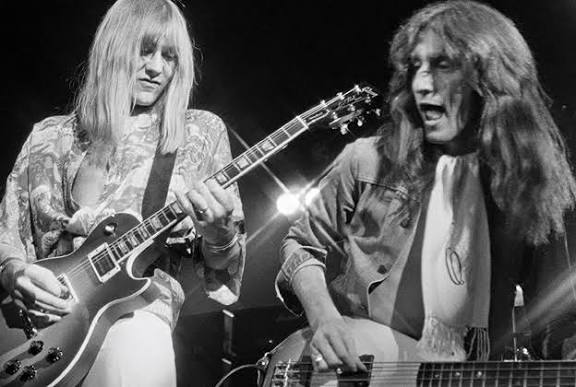Flashback: Rush Perform “Working Man” at a Canadian School in 1974 — A Glimpse Into the Birth of a Rock Legacy That Would Change Music Forever to….
Long before Rush became one of the most revered names in rock history — known for their virtuosic musicianship, complex compositions, and thought-provoking lyrics — they were just three young men from Toronto, chasing a dream that seemed impossibly big. In 1974, that dream began to take tangible form when Rush performed “Working Man” at a Canadian high school, an electrifying moment that would unknowingly mark the beginning of their meteoric rise to global stardom.
The performance, now regarded as one of the band’s most legendary early appearances, captured Rush at their rawest and most passionate. The lineup — Geddy Lee on bass and vocals, Alex Lifeson on guitar, and the recently departed John Rutsey on drums — delivered a performance that shook the walls of the modest gymnasium and left students speechless. At that time, Rush had yet to release their breakthrough album, and their music was still circulating among local radio stations and basement rehearsals. But that day, in front of a few hundred teenagers, something extraordinary happened — the spark of a legend was lit.
The song “Working Man”, written during the band’s formative years, was an anthem that resonated deeply with Canada’s working-class identity. With its gritty guitar riffs, thunderous rhythm, and Lee’s soaring vocals, it spoke directly to ordinary people who clocked in and out of their daily jobs, dreaming of something more. “It’s a song about the people we grew up with — the everyday heroes,” Alex Lifeson would later recall in interviews. “We were just kids trying to make music that felt real, something that represented where we came from.”
The 1974 performance was more than just another gig — it was a pivotal moment in Rush’s journey. Unbeknownst to them, a local radio DJ happened to get his hands on a recording of “Working Man” and began spinning it on Cleveland’s WMMS-FM. The response was immediate and overwhelming. Listeners flooded the station with calls, believing Rush was a new British act. Within weeks, the buzz spread across the border, catching the attention of record executives who would soon sign the band to Mercury Records.
That school performance symbolized everything Rush stood for — authenticity, dedication, and relentless pursuit of excellence. They weren’t flashy, and they didn’t rely on gimmicks. Their music spoke through skill, sincerity, and heart. The performance also marked one of the final shows with original drummer John Rutsey, who left the band shortly after due to health issues. His departure led to the arrival of Neil Peart, whose drumming prowess and lyrical genius would transform Rush into one of the most innovative and influential bands of all time.
Looking back, the “Working Man” performance is not just a nostalgic piece of rock history — it’s a reminder of how humble beginnings can evolve into monumental legacies. In an era before viral fame and streaming platforms, Rush’s rise depended on raw talent, word-of-mouth support, and sheer perseverance. That 1974 high-school show proved that music with soul doesn’t need a massive stage or special effects to leave an impact. It only needs passion and connection.
Today, five decades later, Rush’s influence continues to echo across generations. Modern rock and metal bands frequently cite them as a primary inspiration. Their songs have become cultural touchstones, and their message of individuality, creativity, and integrity remains timeless. Fans still revisit early performances like that unforgettable school concert to witness where it all began — when three young men from Toronto turned a small stage into a launching pad for one of the most remarkable journeys in rock history.
What started as a simple school performance in 1974 became a symbol of the working man’s dream — proof that greatness can rise from the most unexpected places. Rush didn’t just play “Working Man” that day; they lived it. And the world has never stopped listening.

